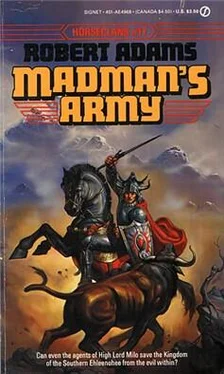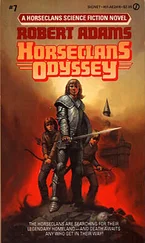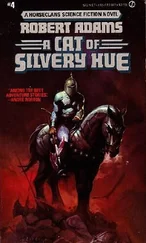Tomos shrugged. “Hopes and prayers are all well and good, my friends, but judging only upon what has happened, and not happened, recently, I must be pessimistic and conclude that the firm choice of a full panel may take longer than merely one more week.”
However, before any panel of officers could be formally invested, the most displeased Grand Strahteegos played one of his hole cards, ordering almost all of Council’s army on the road to Sahvahnahspolis, far and far to the east of the Consolidated Thoheekseeahnee. It was a march that no single officer or man in his command was at all anxious to undertake, calling as it did for some two or three days and nights of marching through and camping in swamps and salt fens which happened to be the territory of huge, scaly, predaceous monsters, deadly snakes, strange and hideous fevers, bottomless concealed pits of quicksand and, by far the worst of all the terrors awaiting them, the barbarian swamp-dwellers or fen-men.
Not a few of the officers and soldiers were terrified at thoughts of even entering that dim, damp, death-crawling realm of the sinister fen-men, who were seldom seen and who killed from a distance with blowgun darts steeped in poisons—estimates of the actual distance, accuracy and lethality of the poisons varied greatly, dependent mostly upon just how close was the individual speaker to fear-induced hysteria at the time of the telling.
But it was cold, hard, incontestable fact that entire companies and battalions of well-armed and -led troops had marched into those fens that bordered most of the eastern and southern coasts and never returned, their bodies not even being found, nor any traces of their weapons and equipment. Such incidents as this had most recently occurred during the infamous “March of Royal Conquest” of the late, unlamented and last king of the Kingdom of the Southern Ehleenohee, which land was now metamorphosed into the Consolidated Thoheekseeahnee of Southern Ehleenohee. Leading his vast host of hundreds of thousands, High King Zastros I had marched into the southernmost lands of the Kingdom of Karaleenos on an ill-starred, poorly planned military operation that had ended in disaster and the deaths of him and his queen on the banks of the Lumbuh River. [1] See Swords of the Horseclans (HORSECLANS #2).
On the march north, however, when harassed on his right flank by fen-men, he had sent units into the swamps after the raiders. Smaller units had been lost entirely; of larger ones, ten to fifteen percent of the original units had returned, stumbling from out the swamps all bearded and filthy and starved, afflicted with strange fevers, skin diseases never before seen by the eeahtrohsee , bloody dysentery and degrees of madness that bred sleeping and waking nightmares. When he once had debriefed a few of the officer-survivors of the largest unit to come out of the swamps more or less alive, High King Zastros had never again sent troops into the deadly swamps and had, indeed, seen that the march-route of his columns was narrowed so as to be well to the westward of the peripheries of the salt fens and the barbarians who dwelt therein, for all that it slowed the progress of his horde considerably.
That the Grand Strahteegos Thoheeks Pahvlos was now clearly intent on forcing his entire army into another patch of these brooding places of death was, in the eyes of his already more or less disaffected men, but more evidence that their once-revered commander had changed, drastically and for the worse, and now meant them all no slightest good. Even so, they had taken their oaths, sacred oaths, and so they all, perforce, felt that they must obey … all, that is, save for the individuals who found or made the time and the opportunity to take hopefully-permanent leave of their insane commander, the army and all.
The traditional Ehleen punishment for apprehended deserters was simply death—by hanging or decapitation, usually. But despite his well-earned reputation as an army traditionalist, there was nothing traditional about the manners in which the Grand Strahteegos dealt with deserters or with any other common soldiers who chanced to break one of his new plethora of rules and edicts—which seemed to ever expand in quantity, even as the earlier ones became ever stricter.
In the little cleared space behind army headquarters, wherein he and Ilios, his catamite, lived in a suite of ground-floor rooms, he had had erected two whipping-frames of heavy lumber, a rack and a massive table fitted with straps and manacles. There, shaded by an awning, he and Ilios would sit and drink cooled wine and nibble at fruits and bits of cheese or crisp biscuits while men were slowly whipped to death or permanently crippled on the rack or blinded with sharp stakes or otherwise mutilated while chained and strapped to the bloodstained table. And the men used so atrociously for his enjoyment were not deserters, but mere troopers who had tried to visit women beyond the perimeters of the sprawling camp, had been caught bringing women into the camp, had been apprehended with unwatered wine or any other potable than wine, had been caught with pipes, tobacco or hemp in their possession or had transgressed in any way against the hordes of near-senseless rules and regulations that his brain continued to invent and his staff continued to churn out for distribution to his command.
For deserters and those guilty of crimes of a truly capital nature, the old commander had had the official army execution site adjacent to the drill field enlarged to include four permanent poles for crosses, two double gallows, and a raised platform fitted for either a whipping-frame or an impalement stake; another platform held the frame of a rack and a table that was the mate of the one behind his headquarters building. Beneath each of the platforms were low sheds wherein were kept the smaller but necessary implements— braziers, whips, pincers, branding-irons, manacles, straps, ropes, prepared oaken impalement stakes, an assortment of sharp knives of various sizes and shapes, hand-bellows for making coals burn hotter, iron bars for breaking bones, mauls for pulping hands or feet, differing sizes of pliers for drawing or breaking off teeth or for tearing out tongues.
Now the common soldiers drilled beneath the shadows of wheeling buzzards and of flocks of black carrion crows winging swiftly to the grisly feast which awaited them, dangling from gallows-beams or roped to crosses, pretenderized by floggings and savage tortures.
At two meetings of senior officers of the army with their Grand Strahteegos , old Pahvlos had blamed the increasingly high incidences of sell-back of rank among officers and desertions of common soldiers on a general breakdown in discipline engendered by excessive coddling of the troops. A prime and flagrant example of this distressing trend was, he noted, that of the thief and mutineer Captain Vahrohnos Bralos, onetime commander of the lancers of the Wolf Squadron. He had then harangued his captive audience for almost an hour, each time, on the deadly dangers to discipline and order of treating the common soldier like more than the dumb, unfeeling, seldom thinking brute that he actually was. Such dangerous and larcenous officers as Vahrohnos Bralos, he noted, who frittered away ill-gotten monies on such things as expensive clothing, extra—and completely unauthorized by traditional practices—items of armor, food as good as some junior officer messes, better wines than the army could afford and even tobacco, were underminers of morale among the unindulged soldiers and the very bane of an overall commander’s existence.
The senior officers heard him out—what else could they do?—but the few who took his diatribes to heart had been of his personal clique before he had begun. Most of the officers recognized just what he was trying to accomplish and knew full well just why he was trying to accomplish it. Unimpressed by him, they all knew exactly why their soldiers were deserting or trying to desert or purposefully injuring themselves; they were doing so for the same reasons that so many junior officers were either trying to sell back their ranks or just resigning and riding off to their homes the poorer. The combination of old Pahvlos’ dogged determination to convert the entire army to total abstinence from women, unwatered wine, and the use of either hemp or tobacco if he had to flog, maim, mutilate or kill half of them to do it would have been enough, but with a useless, senseless march into the swamps and salt fens looming in the near futures of them all, it did not take an intellectual giant to perceive that Council’s army, now commanded by an obvious madman, was become a distinctly unhealthy place in which to remain longer. Indeed, not a few of the senior officers were thinking seriously of early and quick retirement to their lands or cities, had the old man but known.
Читать дальше












